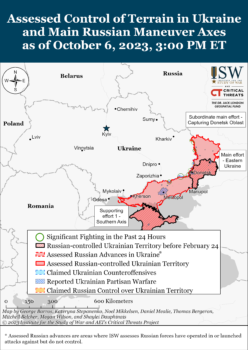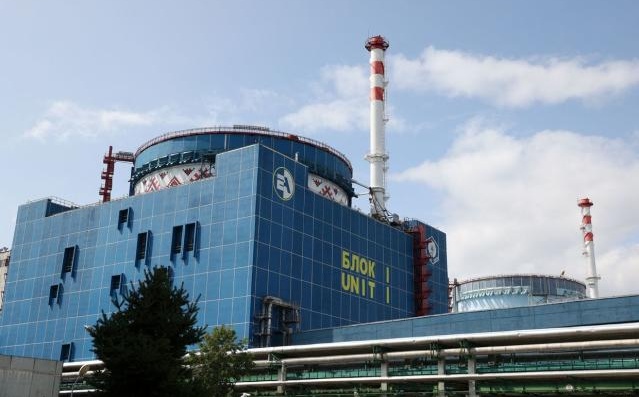The Khmelnytskyi Nuclear Power Plant in western Ukraine

Map: Institute for the Study of War
UPDATE 1805 GMT:
Denmark’s Defense Ministry has announced the provision of another 3.7 billion Danish crowns ($523 million) in military equipment to Ukraine.
The package includes tanks, infantry fighting vehicles, artillery ammunition, and drones.
UPDATE 1728 GMT:
Russia’s Investigative Committee has formally charged American-Russian journalist Alsu Kurmasheva with failing to register as a “foreign agent”.
In early June, Kurmasheva was prevented from leaving Russia after a visit for a family emergency. Both her American and Russian passports were confiscated.
Criminal charges were announced on October 18, and she was detained immediately. She faces up to five years in prison if convicted.
Kurmasheva, who works for Radio Free Europe/Radio Liberty, is the second US reporter detained in Russia during Vladimir Putin’s invasion of Ukraine, following the seizure of Wall Street Journal reporter Evan Gershkovich in March.
UPDATE 1053 GMT:
As expected, new Slovakian Prime Minister Robert Fico has announced an end to military aid to Ukraine.
Fico is leading a three-party coalition government after his SMER party won the largest share of the vote on September 30.
Fico told MPs on Thursday, before going to a summit of EU leaders in Brussels: “I will support zero military aid to Ukraine….An immediate halt to military operations is the best solution we have for Ukraine. The EU should change from an arms supplier to a peacemaker.”
Humanitarian aid will continue. However, Fico said, “[I will] not vote for any sanctions against Russia unless we see analyses of their impact on Slovakia. If there are to be such sanctions that will harm us, like most sanctions have, I can see no reason to support them.”
UPDATE 0924 GMT:
Ukraine has suspended the use of the Black Sea grain corridor, breaking the Russian blockade of Ukrainian ports, because of military risks.
The Kyiv-based Barva Invest consultancy sent the message, “We would like to inform you of a temporary suspension of vessel traffic to and from 9the ports). The current ban is in force on October 26, but it is possible that it will be extended,” the consultancy said on the Telegram messaging app, the Reuters news agency reported.
Ukrainian officials were not immediately available for comment.
UPDATE 0752 GMT:
South Korea, Japan and the US say they have confirmed “several” deliveries of North Korean arms to Russia.
Analysts cite movement of vessels carrying containers, likely with weapons, between North Korean and Russian ports. The containers were tracked to a Russian munitions storage facility near the border with Ukraine.
A joint statement said:
The Republic of Korea, United States, and Japan strongly condemn the provision of military equipment and munitions by the Democratic People’s Republic of Korea (DPRK) to the Russian Federation for use against the government and people of Ukraine.
Such weapons deliveries, several of which we now confirm have been completed, will significantly increase the human toll of Russia’s war of aggression.
The three countries noted that North Korea is seeking assistance from Russia for advances in its military capabilities in return for the artillery shells and other munitions to Moscow. They added that any arms transaction with North Korea violated multiple UN Security Council resolutions which were passed with Russia’s support.
UK military intelligence adds that it is “almost certain” that North Korean munitions have reached ammunition depots in western Russia.
The analysts continue:
If North Korea sustains the recent scale and pace of military-related shipments (more than 1,000 containers over the last several weeks), it will be on course to become one of Russia’s most significant foreign arms suppliers, alongside Iran and Belarus.
It is currently unclear what Russia has agreed to provide North Korea in return. It is unlikely the full package has been finalised; it was highly likely one of the primary discussion topics during recent senior level Russian visits to North Korea.
It will likely include a mixture of financial compensation, other economic support, the provision of military technology, and cooperation on other high technology areas, such as space.
North Korea and Russia have each denied the military supplies. However, Russian officials have signalled cooperation through high-profile visits to Pyongyang, including Sergey Lavrov’s meeting with North Korean leader Kim Jong-un last week, and Kim’s trip to see Vladimir Putin in the far east of Russia in September.
UPDATE 0629 GMT:
Two civilians, including a child, have been killed and four injured in the latest Russian attacks on the Kherson region in southern Ukraine.
Russian troops fired 365 shells in 51 strikes over 24 hours, said Governor Oleksandr Prokudin.
An 83-year-old woman was injured and retrieved from rubble after Russian shelling of the Kharkiv region in northeast Ukraine on Thursday. One house was destroyed and three damaged.
ORIGINAL ENTRY: President Volodymyr Zelenskiy has spoken of Ukraine’s preparations for a second winter of Russia’s “energy war”.
Ukraine withstood months of Russian missile and drone attacks last year, with Vladimir Putin seeking to break Kyiv’s resistance by freezing the population.
At one point, the assault knocked out half of the Ukrainian grid. However, ai
r defenses held out, and repairs were carried out by the spring.
Russia has continued missile and drone attacks on a daily basis, but the intensity is far diminished. Last winter, Moscow fired more than 100 missiles and Iran-made “kamikaze” drones on a single day. On Wednesday, the Ukraine Air Force reported 11 drones and no missiles.
Zelenskiy posted yesterday after a conference with officials, linking defense with Ukraine’s escalating attacks on Russian targets such as warships, airbases, bridges, oil depots, and supply and logistics points.
We are preparing for terrorist attacks on energy infrastructure. This year we will not only defend ourselves but also respond.
The enemy is well aware of this. First, they withdrew their fleet from Crimea, and now they are moving their aviation further away from our borders.
Oleksiy Danilov, the Secretary of the National Security and Defense Council, said the Ukrainian power system is better protected from missile attacks than last year, He cited the arrival of additional air defense equipment from international partners.
Russian Drone Attack Threatens Nuclear Power Station
While defenses downed all 11 Russian drones on Wednesday, blast waves and falling debris damaged buildings near the Khmelnytskyi nuclear power plant in western Ukraine, wounding 20 people.
The International Atomic Energy Agency said the Russian attacks temporarily cut power to two of 11 off-site radiation monitoring stations.
The attack did not affect the nuclear power plant’s operations or its connection to the electricity grid, but Director General Rafael Grossi warned:
This incident again underlines the extremely precarious nuclear safety situation in Ukraine, which will continue as long as this tragic war goes on.
The fact that numerous windows at the site were destroyed shows just how close it was. Next time, we may not be so fortunate. Hitting a nuclear power plant must be avoided at all costs.
In his nightly address to the nation, Zelenskiy said that each Russian strike, “especially those daring enough to target nuclear power stations and other critical facilities, serves as an argument that pressure on the terrorist state is insufficient”.
The President called for more international sanctions on Moscow in response to the strikes.

